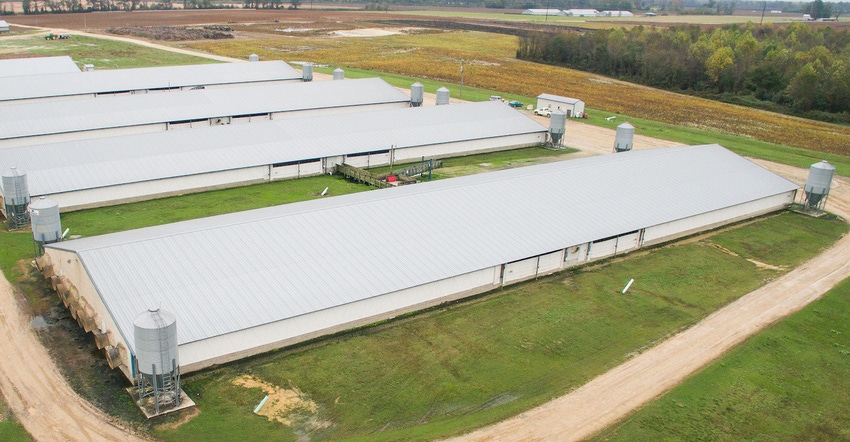Ag groups file appeal on North Carolina hog farm verdicts
Farm bureau and pork producer groups say hog farms that followed regulatory regime should be insulated from punitive damages.

A judgment stemming from a $50 million verdict must be overturned, farm groups told a federal appeals court in Richmond, Va., on March 5.
Earlier last year, juries in three separate trials in Raleigh, N.C., awarded punitive damages of more than $500 million to neighbors of North Carolina hog farms. Plaintiffs claimed that the odor and truck noise related to the farms should be declared a nuisance. The first judgment from these trials is the subject of this appeal.
However, runaway damages awards based on commonplace and highly regulated farm activities would cause enormous harm to farmers and rural communities, a brief filed by the American Farm Bureau Federation, National Pork Producers Council, North Carolina Farm Bureau Federation and North Carolina Pork Council said.
Attorneys noted that the North Carolina Right to Farm Act, which recognizes that normal farming practices do not constitute a nuisance, insulates farmers from these types of suits.
What’s more, North Carolina law states that punitive damages should be awarded only if the defendant has acted with “fraud, malice or willful or wanton conduct.” In the words of the statute, “it means more than gross negligence,” the brief said, but here, the farmer was in full compliance with North Carolina’s comprehensive regulatory regime as well as industry-wide practices – conditions that should insulate defendants from punitive damages.
Although the suit was aimed at pork processor Murphy-Brown, the practical result of the judgment is that the farmers involved will be unable to continue as hog farmers in the state, the brief said.
“Imposing quasi-criminal punishment on Murphy-Brown for creating a nuisance when its contract grower has operated its farm in compliance with state regulation is not only extremely unfair but also highly destructive of our nation’s rural, agriculture-dependent economy,” the brief said.
As disastrous as the ruling is for the farmers, the damage likely won’t stop there. The groups told the court that virtually any farm, anywhere, could be subject to nuisance litigation if the ruling is allowed to stand. “The only winners from this litigation are plaintiffs and their entrepreneurial lawyers, who walk away with windfall damages and enormous fees unrelated to any plausible measure of harm,” they wrote. “The losers are rural communities that stand to shed dollars, jobs and economic and social stability and consumers who lose the benefits of reliable and efficient methods of agricultural production.”
The brief added, “Lawsuits aimed at agriculture are often funded and engineered by outside interests who know little of rural communities or the agricultural way of life but are politically and socially opposed to farmers and their businesses. Plaintiffs’ closing argument attacked modern agriculture while promoting visions of small 75-hog, multi-crop farms as the ideal. Around the country, litigation threats and uneconomic environmental standards are part of a war on farmers, with no less ambitious a goal than ending modern methods of agricultural production.”
Finally, the brief warned the court that jury selection had been restricted to people who lived in urban areas, none of whom had been permitted to visit the farms in question. The combination of a jury unfamiliar with farm country, let alone the farms in question, leaves agricultural communities doubtful that they can get a fair hearing from the court system, it said.
Another farm on trial
Also on Tuesday, a Texas lawyer stood before a jury in Raleigh at the close of the fifth nuisance hog farm trial.
North Carolina Pork Council chief executive officer Andy Curliss said the lawyer urged the jurors to award $30-50 million in total compensatory damages to the 10 neighbors.
Curliss relayed that, during the court closing, the lawyer agreed that no plaintiff has been injured in the case, none of the plaintiffs’ property has gone down in value (property values have increased, and some 75 new homes have been built in close proximity to the farm) and no plaintiff claims a problem with their water, which comes from private wells.
"The witness the jurors heard from the most was a professor from Clarkson University in upstate New York, a paid expert who wants to turn a hog farm into a nuisance. When the professor visits a farm, he wears a Hazmat suit – great theater to show jurors who were not themselves allowed to tour the neighborhood or see the farm at issue, some 100 miles away," Curliss said.
"'Focus,' [the Texas lawyer] told the jury, 'on how low the burden for a judgment in this case is.' He told the jury it is so low that even he acknowledges some of them may not be convinced that the farm has been a legal nuisance to any of the neighbors, and that would be okay, he told them," Curliss said in his blog posting following the trial. Certainly, they have doubts, he said, adding, "It doesn’t matter. The burden in this type of civil case, he stressed, isn’t a high one."
About the Author(s)
You May Also Like





